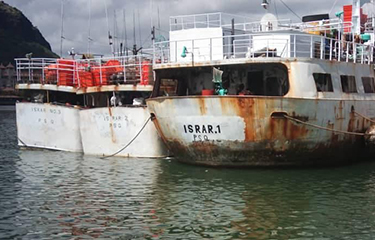Illegal fishing fleet blacklisted by ICCAT following EJF investigation

A fleet of three vessels that has tried to evade scrutiny of its illegal activities has been blacklisted by the International Commission for the Conservation of Atlantic Tunas (ICCAT), and the fleet’s insurance provider is considering dropping their coverage following an investigation by the Environmental Justice Foundation (EJF).
The fleet, which has operated in the Atlantic for years, first drew EJF’s attention when satellite monitoring of the three vessels’ movements demonstrated they were long-lining for tuna without registering with ICCAT, the regional fishery management organization that oversees the Atlantic tuna-fishing sector.
The EJF investigation included satellite tracking, social media monitoring, and interviews with crew, and found “extensive evasive action to avoid any oversight of illegal actions," according to the NGO. The investigation found the vessels used a number of methods to evade scrutiny, including switching the flags of nations – or flying none at all – changing vessel names, switching automatic identification system codes mid-voyage, and illegal transshipment of catch, supplies, or crew, EJF said in a release.
“This is a textbook example of operators using the chronic lack of transparency in fisheries to perpetrate crimes and decimate ocean ecosystems, and that urgently needs to change,” EJF said.
During its annual meeting in November 2021, ICCAT added the three vessels to its illegal, unregulated, and unreported (IUU) fishing vessel list, which means the vessels may lose market access for their products. Further, based on the EJF’s evidence, the insurance company used by the vessels is considering dropping the fleet, putting the operators at severe financial risk – which is one way to force unscrupulous operators to reconsider whether to engage in illegal fishing activities and drive them towards compliance, according to EJF. At the moment, EJF is not disclosing the name of the insurer, EJF Communications Manager Daisy Brickhill told SeafoodSource.
The vessels' International Maritime Organization (IMO) numbers are 8004076, 8568694 and 8568682, she said. Vessel 8004076’s current name ISRAR 1 (former names MARCO 21/MEGA NO. 2); while vessel 8568694’s current name is ISRAR 2 (former names RICOS NO. 6/MARIO NO. 6); and vessel 8568682’s current name is ISRAR 3 (former names RICOS NO. 3/MARIO NO. 3).
Currently, the vessels are flagged to Oman, and previously EJF has records of 8004076 being flagged to Belize and 8568682 and 8568694 to Saint Vincent and the Grenadines.
The current registered owner and operator of all three vessels is listed as Almuran International LLC on the Indian Ocean Tuna Commission (IOTC) website; however, maritime databases list Starlight LLC in Oman as the registered owner and operator, according to Brickhill.
Previously, two of the vessels - ISRAR 2/RICOS 6 and ISRAR 3/RICOS 3 - were reportedly owned by a company incorporated in Belize named Great Vision Co., according to maritime databases. Before that and under previous identities, they had also been associated with companies in Vanuatu and Tanzania.
The ownership history of the ISRAR 1/MARCO 21 is even more opaque. According to maritime database, it was associated with companies based in Vanuatu, Indonesia, and Thailand. ICCAT records on the vessel also previously associated it with South Africa-based Ocean Empire Trading.
“This operator used every trick in the book to evade scrutiny of its illegal actions,” EJF CEO Steve Trent said in the release. “This is one fleet, and while I am very glad to see ICCAT taking this action, that is not the ultimate solution.”
EJF said since its punishment, there is evidence the fleet has shifted its operations from the Atlantic to the Indian Ocean, leaving ICCAT's jurisdiction.
“To prevent others from perpetrating these illegal acts, to safeguard ocean ecosystems, food security and livelihoods around the world, we need to shine a light onto all these operations through transparency, which can help governments, regional fisheries management organizations, law-abiding fishing companies, NGOs, retailers and even consumers to work together to rid our oceans of these damaging operators," Trent said.
Photo courtesy of the Environmental Justice Foundation






Share